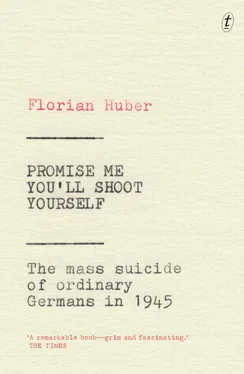Florian Huber
PROMISE ME YOU’LL SHOOT YOURSELF
THE MASS SUICIDE OF ORDINARY GERMANS IN 1945
Part I
FOUR DAYS IN DEMMIN

‘We reached another town towards morning. Demmin.’
At the end of the dead-straight avenue, a massive church tower was silhouetted against the dim light of dawn. The rows of sycamores, receding into the distance, led the eye to the tip of the spire, which pointed, needle-like, into the soft pink sky—a tissue-paper cut-out scored with a razor blade, at once slender and powerful, filigree and solid. It was the first time that Irene Bröker had seen anything to break the monotony of the landscape. All she had to do now was to make straight for it.
Irene Bröker was a twenty-three-year-old woman who in late April 1945 was fleeing with her family—or what was left of it—from the north-eastern city of Stettin. Her husband, Werner-Walter, had been missing since the previous autumn, and she had been separated from her parents, father-in-law and sister-in-law during an air raid the day before as they passed through the town of Anklam. Her parents’ carriage had been left behind with a broken wheel, while she was shunted out of town in her car, caught up in the dense flow of vehicles, people and horses. When she looked for her family later, she couldn’t find them. Only little Holger, her two-year-old son, was still with her. She was careful not to let him stray from her side.
The two of them were not, however, entirely alone; in Löcknitz, a few miles west of Stettin, they had been joined by an elderly doctor and his wife. Like many women faced with hardship after a previously well-ordered life, Irene Bröker had developed remarkable coping skills—not only the ability to suppress all but her most vital emotions, but also the art of finding allies in strangers. Dr P., as Irene Bröker calls the doctor in her memoirs, was to be her greatest support in the days to come. She knew that difficulties lay ahead; she had even provided for a time when she might no longer want to live. On a string around her neck, Irene Bröker carried a small watertight pouch.
Towards morning, then, they arrived in Demmin. For Irene Bröker it was just another name on the escape route; the town surrounding the red-brick church tower that dominated the landscape for miles around held neither memories nor meaning for her. The end of her march lay much further west, beyond the reach of the Russian soldiers.
The horrors of the winter trek—frosty nights and snowstorms on icy roads—were a thing of the past. The second half of April was marked by beautiful spring weather; the countryside was burgeoning. A haze of young green covered the trees and fields; the days were warm, the nights mild. Apart from the occasional shower, there was no rain. But like so many others, Irene Bröker and the doctor and his wife had made only halting progress during the night. By the time they reached the eastern outskirts of Demmin that morning, they were worn out.
We got bogged on a sandy track and had to abandon some luggage to get going again. Many, many valuables had already been left by the roadside and in the fields. We stopped on the outskirts of Demmin, at a big house next to the cemetery. The occupants had fled town that evening. Too exhausted to go any further, we treated ourselves to a night’s rest.
After many sleepless nights, broken only by the occasional chilly nap by the roadside when the trek came to a halt, Irene Bröker had lost all sense of time and was longing for a rest. The stopover in Demmin wasn’t supposed to be more than a quick breather. But the town was a bottleneck. There were three rivers to be crossed on the road west.
• • •
A few hundred yards from the house where Irene Bröker slept, a unit of Wehrmacht soldiers had taken up quarters at a former Prussian cavalry barracks. Among them was Gustav Adolf Skibbe, a fifty-three-year-old from the West Prussian city of Elbing. Skibbe had entered the war late. If the Volkssturm—the old men and Hitler Youth boys called up to serve as a national militia—were the country’s last reserves, Skibbe was among the second-to-last. A few months earlier, he’d been hoping to survive the war at home with his family, but since general mobilisation in January 1943, the civilian population had been sifted with an ever finer sieve until he, too, was caught in its mesh. Skibbe was conscripted in December 1944. Scarcely two months later, his native Elbing was lost in a fierce battle, and he spent the weeks that followed far from the action, mainly around Berlin, nearly five hundred kilometres to the south-west. Then, on 14 March, he came to Demmin. It was four weeks since he’d last seen his family. It was a trying part of the war for him; there was a lot of waiting and toiling and standing around on draughty railway stations. His bones ached; he felt his age. ‘Wretched night, sore feet,’ he writes in the slim notebook he used as a war journal. ‘In Oranienburg, thank God, I was given insoles.’
In his journal, Skibbe kept a brief record of the places where he was billeted, his health and—on rare occasions—his emotions. He wasted hardly a word on the war itself, and less still on politics.
In Demmin, Skibbe’s unit was billeted in the former Uhlan Barracks on Jarmener Strasse. He was kept busy there—mainly, his journal suggests, servicing and repairing machinery—but he noticed the mood of nervous apprehension that had taken hold of residents and refugees alike. He noticed, too, their growing distrust of the troops who were to defend them.
Everything at sixes + sevens. Got hold of sawdust mattresses. 3 men, Möller, Schink and I, sleep in backroom. V. primitive. People v. subdued, almost desperate because of overcrowding in town.
Days passed ‘without much of note’. There was a lot of work to be done. Skibbe concentrated on his machines and, in between times, made the most of the lovely spring weather. On the east side of town, women and schoolchildren dug miles of steep-sided anti-tank ditches and drove wooden stakes into the ground to make tank traps, while the never-ending flow of refugees surged between them into town in dense clutches. The Red Army, which had begun its advance on Western Pomerania, drove them along like water before the bow of a ship.
• • •
Demmin-born Marie Dabs, daughter of a sea captain and wife of the furrier and gentlemen’s outfitter Walter Dabs, was familiar with the refugees. Wave after wave of them had passed through town since February, some staying with relatives, others in rooms or dormitories allocated by the billeting office. Most of them carried on westwards, but they were soon replaced by the next lot. Since her husband had been called up, Marie Dabs had been living alone with her children, Nanni, nineteen, and Otto, fifteen, in the flat behind their shop on Luisenstrasse. The billeting office had sent her an elderly refugee woman from Memel, who complained all the time and hogged the kitchen. ‘She was forever frying,’ Marie Dabs remembered later, ‘especially in the evenings.’ They had let her have Otto’s bedroom, which was soon the worse for wear. When the woman moved on west with her daughter, two young sisters from another refugee family moved in, this time taking over Nanni’s newly decorated room.
Forty-two years old, Marie Dabs had lived all her life in the bourgeois milieu of the small district town. An artfully composed photographer’s portrait of her shows a woman with carefully pinned-up hair whose face speaks of pride at a prosperous life. Now she was having to share that life with complete strangers from the east, and, seeing the fate of the refugees, she often found herself worrying about her own future. Several times she got as far as deciding to leave town with the children. Her friends the Hansens, landowners who lived near Flensburg, in north-west Germany, had sent telegrams urging her to join them; the suitcases were packed and ready. But Marie Dabs let bureaucrats and military brass convince her to stay and keep the shop up and running; the authorised medal and military-decoration business that she ran alongside the furriery had seen a sudden surge in sales in the past weeks. A Wehrmacht general had bought up her entire stock of medals, explaining that, after so many battles, he’d run out. Marie Dabs could feel the front moving closer.
Читать дальше














